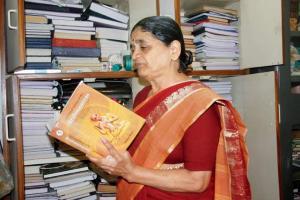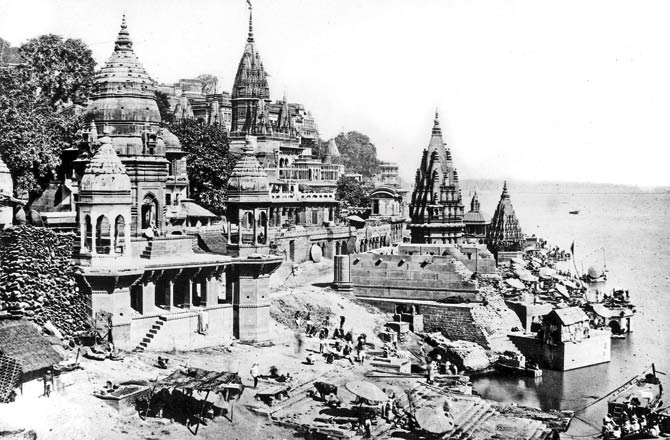Her pursuit of the Brahmasutras began in Kashi in 1998. She is currently studying the Nyaya Sutras. Meet Dr Shailaja Bapat, the Bhasha Samman awardee of the Sahitya Akademi, who will travel anywhere in search of handwritten manuscripts

Dr Bapat, who lives with her sister, is thankful for a family that exempts her from pressures of socialisation. Pic/Mandar Tannu
 If you get robbed in Varanasi, Lord Shiva offers you salvation and lasting peace. Pune-based Sanskrit scholar-author Dr Shailaja Bapat had no patience for such popular beliefs when she was deprived of cash, reference notes and a key treatise on Vedant philosophy while aboard the Varanasi-bound Gyan Ganga Express sometime in 1998. As she got off at the Manduadih railway terminus, she was busy borrowing money and resources to conduct her intended research on Brahmasutras (the foundational text which decode the Upanishads, which are the spiritual core of Hinduism) in Varanasi's libraries. While she was left with only tears, and a story about two pickpockets who jumped off the decelerating train, the Kashi dwellers did not fail to tell her to see the silver lining in her state of loss. They reminded her of the possibility of moksha, each time she recounted her saga, in and out of the city's libraries.
If you get robbed in Varanasi, Lord Shiva offers you salvation and lasting peace. Pune-based Sanskrit scholar-author Dr Shailaja Bapat had no patience for such popular beliefs when she was deprived of cash, reference notes and a key treatise on Vedant philosophy while aboard the Varanasi-bound Gyan Ganga Express sometime in 1998. As she got off at the Manduadih railway terminus, she was busy borrowing money and resources to conduct her intended research on Brahmasutras (the foundational text which decode the Upanishads, which are the spiritual core of Hinduism) in Varanasi's libraries. While she was left with only tears, and a story about two pickpockets who jumped off the decelerating train, the Kashi dwellers did not fail to tell her to see the silver lining in her state of loss. They reminded her of the possibility of moksha, each time she recounted her saga, in and out of the city's libraries.
Twenty years later, as Dr Bapat receives Sahitya Akademi's Bhasha Samman for her contribution to Classical and Medieval Literature, she sees her 1,800-paged Critical Edition of the Brahmasutras (divided in three volumes, published by New Bharatiya Book Corporation, Delhi) as the highlight of her scholarship. The award makes a special mention of her painstaking deconstruction of the Brahmasutras (555 aphoristic verses supposedly written by philosopher Badarayan roughly between 450 BCE and 200 CE; though multiple authors not ruled out) and pays tribute to the rigour manifest in a scholar's exploration. A sizeable glossary of 800 Sanskrit terms annotates the critical edition, which undoubtedly makes it a heavy read; it presupposes an insider reader (Sanskrit or theology student) who not just values the record 10 years devoted to unlocking the variant commentaries on the original Brahmasutras, but also imbibes research methodologies while negotiating three hefty tomes weighing nearly three kilos.
Dr Bapat's research prides on exchanges with far-off documentation centers (including the Bodleian Library of Oxford University) and visits to 26 major Indian libraries for studying 250-odd handwritten documents (some on palm leaves) in which the Brahmasutras were adapted in different regions of India. She has decoded seven Indian language scripts (Grantha, Sharada, Devanagari, Telugu, Malayalam, Nandanagari and Bengali) in which the source text was appropriated. Her stint in Paleography (at the Indira Gandhi National Center for Arts, New Delhi) equipped her to decipher the lipis, although she also took the help of reference librarians who doubled up as regional experts.

When she landed in Varanasi in 1998, Dr Bapat's possessions had been pickpocketed. Along with help, the Kashi residents offered her the salve: if you get robbed in Kashi, Lord shiva offers you moksha. Pic/Getty Images
"Unravelling each manuscript was so arduous that I attained moksha in the process of doing so," says the scholar who feels there is no ideal age (she was 47 when she internalised seven scripts) to learn a language. Laughing at the way she had once cried over her train theft, the 70-year-old academician now observes that no tedium or inconvenience can eclipse the joy of pursuit of philosophical truths, more so when the rigour is recognised by the national academy of letters. In fact, she feels the Brahmasutras induced her into great enriching exchanges in places as diverse and distant as Tirupati (Sri Venkateswara University), Adyar (Adyar Research Center), Chennai (manuscripts library of University of Madras) and of course Varanasi (Benares Hindu University) where reading material was bountifully offered to her.
In a particularly reflective mood, and surrounded by well-wishers from Pune's academia, Dr Bapat wonders how hindsight enables the human mind to free itself from the shackles of past resentments and inquire about the absolute truth, a fact noted in the Brahmasutras too — athÄu00c2u0081to brahma jijñÄu00c2u0081sÄu00c2u0081. She feels the Sutras help the scholar to look inward and realise the possibility of a life beyond bheda (differences) and narrowness.
"Vedant philosophy is a means to be more self-aware, more cognizant of our actions and thoughts, and work towards our elevation." Her interpretation is refreshing in a day and age when Hindu religious texts are touted as unfathomable mysteries, accessible only to seers or theologists, whereas Dr Bapat rereads them in the context of creating a better grip on human life. She had been meaning to write on Brahmasutras when she started teaching Vedanta philosophy in the university, particularly in the context of Adya Shankaracharya's commentary. When she was heading the department of Sanskrit and Prakrit Langauges, she landed up much before the classes started, so that she could study the Brahmasutras. It remained with her while accomplishing her doctorate on Part Whole Relation in Indian Philosophy.
Dr Bapat is well-versed in diverse philosophical streams. As part of a University Grants Commission-funded project, she wrote on the philosophical understanding of the making of Gautama Buddha. She is currently giving finishing touches to her upcoming two volumes on the literature of the Mahanubhav sect. In the pipeline is her Marathi translation of Nyaya Sutras composed by 6th century BCE sage Aká¹£apÄu00c2u0081da Gautama who wrote dictums, rules of reason, logic, and metaphysics. The award thus comes at a time when she is proof reading one tome before it goes to the press, while shaping the second in her Sinhagad Road Housing society. Often people ask her if she sleeps at all! To which her reply is plain: "Scholars also sleep and rest and wake up in the middle of the night to go a certain page of a certain text."
Dr Bapat feels she is lucky to be surrounded by an immediate family and friends who respect her intellectual needs. She lives with one of her sisters (among the four siblings) who is also a scholar-author-feminist (Dr Lata Chhatre) specialising in Buddhist epistemology. She is in "safe company" as her sisters' families, including the other two who live away in Pune, offer a readymade support system. "I am excused from the usual socialization expectations; my late mother and my sister exempted me from kitchen work too, especially when publishers' deadlines neared," she feels the social ecosystem helps or hinders a scholar's abilities to continue research. Being born to parents who were not particularly educated — father was a non-matriculate foreman in an explosive factory and mother a fifth-passed homemaker — she was encouraged to adopt the world of letters as her permanent residence. "Today, if I have to choose between a wedding reception and editing the first-draft of my paper on Kautilya's Views on Punishment, I will unapologetically choose the latter."
Dr Bapat has accomplished most of her academic work in the pre-Internet era of trunk calls and snail mail, which now puts her in the learner's seat of another kind. Initially, she tried to avoid the modern communication devices. Quite often, she lost her content because she failed to save it online. But of late she has made friends with online editing processes, whereas smartphone gaffes keep her forever busy. She calls it the communication sutra!
555
The number of verses in the Brahmasutras written by philosopher Badarayan between 450 BCE and 200 CE
Sumedha Raikar-Mhatre is a culture columnist in search of the sub-text. You can reach her on sumedha.raikar@gmail.com
Catch up on all the latest Crime, National, International and Hatke news here. Also download the new mid-day Android and iOS apps to get latest updates
 Subscribe today by clicking the link and stay updated with the latest news!" Click here!
Subscribe today by clicking the link and stay updated with the latest news!" Click here!





